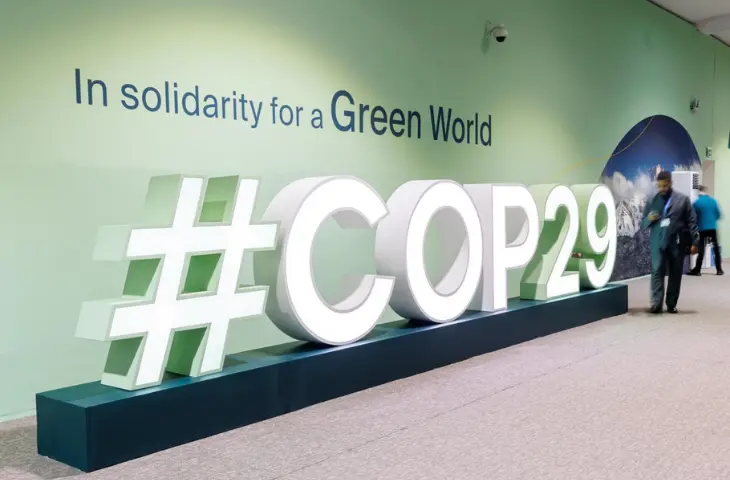Climate change is one of the biggest challenges facing humanity today. Rising global temperatures, extreme weather events, melting glaciers, and rising sea levels highlight the urgency of coordinated global action. To address this, the United Nations Framework Convention on Climate Change (UNFCCC) organizes the Conference of Parties (COP) Summits every year, where countries negotiate and commit to measures aimed at combating climate change. For exam candidates, understanding climate change basics, international agreements, and the role of COP Summits is essential.
What is Climate Change?
Climate change refers to long-term shifts in global or regional climate patterns, largely driven by human activities such as:
- Burning of fossil fuels (coal, oil, gas) → greenhouse gas emissions.
- Deforestation → less carbon absorption.
- Industrial and agricultural activities → methane, nitrous oxide emissions.
Key Impact Areas:
- Increased frequency of heatwaves, floods, and cyclones.
- Melting polar ice caps → rising sea levels.
- Loss of biodiversity and ecosystem imbalance.
- Agricultural stress, food insecurity, and health risks.
The Role of COP Summits
The Conference of the Parties (COP) is the decision-making body of the UNFCCC. All 198 signatory countries meet annually to:
- Assess progress on climate goals.
- Negotiate legally binding agreements.
- Mobilize climate finance and technology transfer.
Timeline of Major COP Summits
From the Kyoto Protocol (1997) to the Paris Agreement (2015) and recent COP outcomes, each summit marks a milestone in global climate action.
| COP | Year | Location | Key Outcome |
| COP 1 | 1995 | Berlin, Germany | Launch of climate negotiations. |
| COP 3 | 1997 | Kyoto, Japan | Kyoto Protocol (legally binding emission reduction targets). |
| COP 15 | 2009 | Copenhagen, Denmark | Political declaration on limiting warming to 2°C. |
| COP 21 | 2015 | Paris, France | Paris Agreement: Limit global warming to well below 2°C, pursue 1.5°C. |
| COP 26 | 2021 | Glasgow, UK | Glasgow Climate Pact: Net-zero pledges, coal phase-down. |
| COP 28 | 2023 | Dubai, UAE | First Global Stocktake, UAE Consensus on fossil fuel transition. |
| COP 29 | 2024 | Baku, Azerbaijan | Focus on climate finance, roadmap for post-2025 funding goals. |
Paris Agreement (COP 21) — The Landmark Deal
Adopted in 2015, the Paris Agreement united 195 countries to limit warming to well below 2°C, with flexible nationally determined contributions (NDCs).
- Signed by 195 countries in 2015.
- Aim: Limit warming to well below 2°C, pursue 1.5°C target.
- Countries submit Nationally Determined Contributions (NDCs) outlining emission cuts.
- Developed nations pledged $100 billion annually in climate finance to support developing nations.
Recent Updates on COP 28 (2023) & COP 29 (2024)
COP 28 in Dubai delivered the first Global Stocktake, while COP 29 in Baku focused on climate finance and set the stage for COP 30 in Brazil.
| COP | Year & Location | Major Highlights |
| COP 28 | 2023, Dubai, UAE | – First Global Stocktake showed policies are insufficient – Agreement on transitioning away from fossil fuels – Commitment to triple renewable energy capacity by 2030 |
| COP 29 | 2024, Baku, Azerbaijan | – Focus on climate finance beyond 2025 – Pressure on developed countries to provide more funding for adaptation & mitigation – Prepared ground for COP 30 in Brazil (2025) on Amazon protection and stronger NDCs |
Challenges in Tackling Climate Change
Despite global efforts, climate change remains hard to tackle due to finance gaps, fossil fuel dependence, equity concerns, and weak implementation.
- Finance Gap: Developed vs developing country responsibilities.
- Fossil Fuel Dependence: Slow transition to renewable energy.
- Equity Debate: Differentiated responsibilities under UNFCCC.
- Implementation Issues: Many pledges not backed by action.
- Geopolitical Tensions: Affect consensus-building at COPs.
Why COP Summits Matter for Exams?
For aspirants preparing for competitive exams like UPSC, State PCS, SSC, Banking, and other government tests, COP Summits are extremely important. These summits combine current affairs, environment, and international relations, making them a recurring topic in both prelims and mains papers. Here’s why they matter:
| Area | Relevance for Candidates |
| Static + Current Affairs Linkage | – Climate agreements like Kyoto Protocol and Paris Agreement are often asked in static GK. – Recent updates like Global Stocktake at COP 28 or climate finance at COP 29 fall under current affairs. |
| Environment & Geography Syllabus | – Topics such as climate change, biodiversity, renewable energy, and global warming are part of the syllabus. – COP Summits provide real-world examples to strengthen answers. |
| Essay & Descriptive Papers | – Exams like UPSC Mains often ask essay topics on climate change, sustainable development, or international cooperation. – Referring to COP Summits demonstrates awareness and depth. |
| International Relations (IR) Importance | – COP decisions highlight the geopolitics of climate change (developed vs developing nations debate, finance commitments, etc.). – Useful for GS Paper 2 and interview discussions. |
| Frequently Asked in Prelims/MCQs | – Typical questions: “Which COP led to the Paris Agreement?” or “Where was COP 29 held?”. – Common in prelims and objective exams. |
| Interview & Personality Test | – Climate change is a global hot topic. – Knowledge of recent COP outcomes helps candidates answer confidently in interviews. |
Example Question:
- “Discuss the significance of COP 28 in global climate negotiations. How does it differ from the Paris Agreement?”
- Here, a candidate who remembers the Global Stocktake (COP 28) and Paris Agreement (COP 21) can write a high-quality answer.
FAQs
Climate change refers to long-term changes in temperature, rainfall, and weather patterns, mainly caused by human activities such as burning fossil fuels and deforestation.
COP Summits are annual global meetings under the UNFCCC where countries negotiate and commit to actions for tackling climate change.
The Paris Agreement was adopted at COP 21 in 2015 (Paris, France).
COP 28 in Dubai delivered the first Global Stocktake, highlighted gaps in current policies, and agreed on transitioning away from fossil fuels.
COP 29 was held in Baku, Azerbaijan (2024). Its main focus was climate finance beyond 2025 and preparing ground for COP 30 in Brazil.
- IBPS RRB Clerk Prelims Scorecard 2026 Out, Office Assistant Marks

- IBPS RRB PO Mains Scorecard 2026 Out for Scale 2 & 3, Download Link

- NABARD Grade A 2026 Interview Preparation Tips, Check Details

- PFRDA Grade A Admit Card 2026, Download Hall Ticket PDF

- PFRDA Grade A Apply Online 2026, Online Application Form Link

- NABARD Grade A Vacancy 2026, Post Wise Vacancy Trend


Priti Palit, is an accomplished edtech writer with 4+ years of experience in Regulatory Exams and other multiple government exams. With a passion for education and a keen eye for detail, she has contributed significantly to the field of online learning. Priti’s expertise and dedication continue to empower aspiring individuals in their pursuit of success in government examinations.
